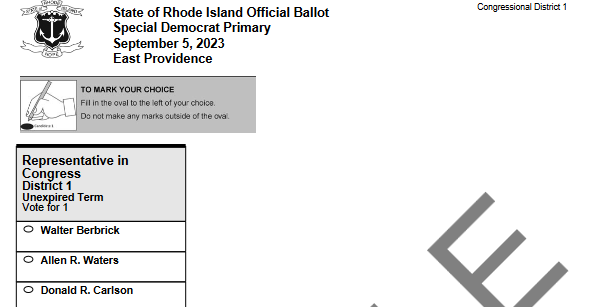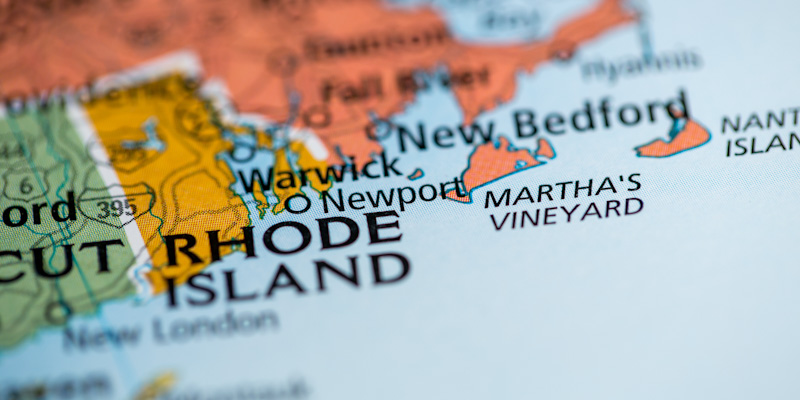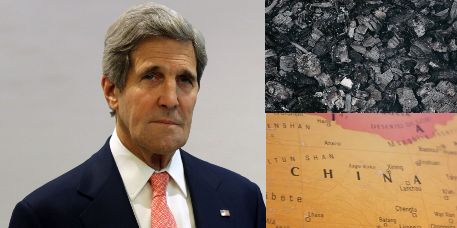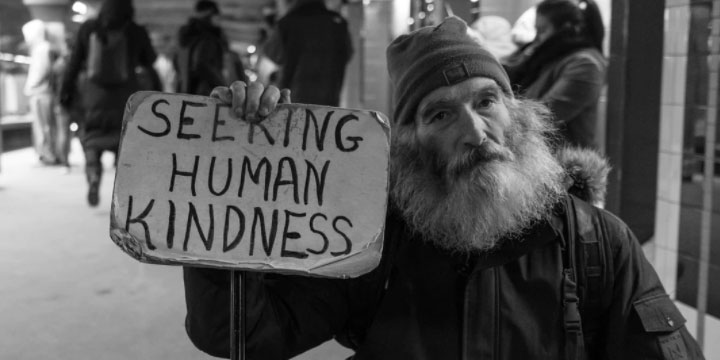Update: The RI BOE voted 5-2 today to review all of the signatures on Sabina Matos’ nomination papers. Ms. Matos is on the Democrat primary ballot for the RI CD1 special election and ballots have already been mailed out to military and out-of-country voters. It is unclear if the outcome of the BOE’s review would result in her being disqualified from the ballot.
It is important to note up front that the Rhode Island Board of Elections was in a no-win situation. Either properly certifying candidates for the ballot or meeting process deadlines: they were not going to be able to execute at least one aspect of their important role in finalizing the ballot for Rhode Island’s CD1 special election.
Three local boards of canvassers, followed swiftly by WPRI and NBC 10, had discovered multiple fraudulent signatures on the nomination papers of Lieutenant Governor Sabina Matos.
The schedule was too tight for the BOE to properly address this disturbing discovery within the requisite timeframe, as the Chairwoman noted to NBC 10.
“The time between certification and the printing of the ballots is insufficient to address any potential irregularities in nomination papers,” Board of Elections Chairwoman Diane Mederos said.
Correct. Faced with this quandary, however, the BOE chose to comply with a too-tight deadline rather than ensure signature and ballot integrity for the CD1 special election. Despite doubts about the validity of Matos’ 728 “certified” signatures, the BOE declined to review them and declared that she had qualified for the ballot.
This was exactly the wrong priority. Integrity of the ballot and properly qualifying candidates for it is paramount for the BOE and for Rhode Island.
They needed to stop everything and check that Matos had enough valid signatures to be on the ballot. Yes, they almost certainly would have missed the deadline to print ballots. Yes, the dates of the primary and general election would almost certainly have to have been pushed back.
And when they were criticized for this, their response should have been, “Step off. We did our job. Rhode Islanders and CD1 voters can have full confidence that all candidates on the ballot have properly qualified. Don’t look to us about unrealistic deadlines. Get with whoever set them.”
The BOE is meeting now for a second time post-certification about the Matos nomination papers. They also need to re-examine and refocus on their primary mission. It is NOT to comply with unrealistic timeframes.
Image: Sample Ballot from RI Secretary of State’s website
[Open full post]Do we have a test case, for bringing this session’s Supreme Court’s ruling in Tyler v. Hennepin County to Rhode Island?
In Tyler v. Hennepin County, in a refreshingly short 9-0 opinion, the Court ruled that when local governments seize property over unpaid taxes, they are only entitled to keep what was owed. So after Hennepin County in Minnesota seized Geraldine Tyler’s $40,000 home over $15,000 in unpaid taxes, it had a duty to return the difference of $25,000 to her. Or as the unanimous majority wrote in the conclusion of its opinion:
A taxpayer who loses her $40,000 house to the State to fulfill a $15,000 tax debt has made a far greater contribution to the public fisc than she owed. The taxpayer must render unto Caesar what is Caesar’s, but no more.
Now move over to Rhode Island and Antonia Noori Farzan‘s story in today’s Providence Journal:
Records show that the City of Providence could be at risk of losing Camp Cronin, its seaside camp in Narragansett, over unpaid property taxes.
The city spent hundreds of thousands of dollars to renovate the long-neglected Ocean Road property last year, but failed to pay the $16,721 that it owed in back taxes.
Consequently, the property went up for a tax sale in October. The lien was purchased for $17,006 by Airway Leasing LLC…
Under state law, Providence can hold onto the property if it pays off the lien – plus interest and any additional fees that the investors tack on – within a year of the tax sale.
If that doesn’t happen, Airway Leasing can foreclose and acquire the 2-acre summer camp, which is valued at nearly $1.1 million, for less than the price of a new Honda Civic.
There are multiple ways this could play out; Providence could pay the back tax bill, which it owes under any scenario, along with some reasonable expenses and close this out by-the-book. On the other hand, under the precedent set in Tyler, Providence could also say to Narragansett, hey we understand, you did what you had to do, and the matter can be settled with a check to cover the $1 million-plus that you now owe us.
[Open full post]Last week came the good news (for our electric bills) that Rhode Island Energy, formerly National Grid, had declined the Revolution Wind 2 offshore wind proposal.
A week prior, John Kerry, President Biden’s Special Presidential Envoy for Climate, departed from China without accomplishing his mission; namely, to
… use climate co-operation to redefine their [US and China’s] troubled relationship and lead the way in tackling global warming
By having both countries give up their reliable, reasonably priced fuel source, of course. But did you know that Mr. Kerry has stated previously that even if the two biggest emitters of manmade greenhouse gases, China (27%) and the United States (11%) gave up fossil fuels and somehow achieved zero emissions, it wouldn’t stop global warming?
“The United States could go to zero tomorrow—I mean we can’t but if you’re figuratively speaking could go to zero—we’d still have a problem. The world would still have a problem,” Kerry told Washington Post columnist Jonathan Capehart. He continued, “If China went to zero tomorrow with the United States, we’d still have a problem. So every country has to come to the table. This is the single biggest multilateral, global negotiation that the world has ever needed.”
Quite the startling statement by someone whose anthropogenic global warming (AGW) credentials are impeccable. In fact, the consensus among AGW advocates and scientists, including the IPCC, is that all countries must go to zero emissions to avoid catastrophic consequences.
Here’s the problem. In that case, the effort to stop global warming DOESN’T GET OUT OF THE STARTING BLOCK. The biggest generator of manmade greenhouse gas, China, will not participate. So there is no point in any other country, much less the smallest state in the second biggest emitter, abating a single molecule of any greenhouse gas.
Here’s the situation with China. AGW advocates in the United States like to brag about all of the renewable energy that China has recently brought on line. But the reality is that China takes an all-source approach to its power needs, cranking both renewables and fossil fuel production. And in the absence of an inexpensive, reliable substitute, the government of China will never give up fossil fuels, the biggest component of their (and many countries’) energy portfolio.
Is this because the government believes this is in the best interest of its citizens? Well, sort of. More immediate, though, is the implication to its political power. Russian-British comedian and social commentator, Konstantin Kisin, explains this plainly in the course of his remarks to the Oxford Union mid-January. Of the 120 million Chinese people who currently suffer from malnutrition, Kissin succinctly observed,
You’re not going to get them to stay poor.
Because the lack of reasonably priced, reliable energy correlates directly to widespread poverty and malnutrition. Which, in turn, would directly correlate to a loss of political power for the current leaders of China. Kisin continued,
And you know that the main thing you have to do to survive and to stay in power is to deliver the one thing that the people of China want: prosperity, economic growth. Where do you think climate change ranks on Xi Jinping’s list of priorities?
In short, the biggest generator of greenhouse gases will not relinquish fossil fuels because that would mean relinquishing political power.
And we are watching this happen in real time. Far from eschewing fossil fuels, China has increased their coal powered energy production, as NPR reported earlier this year. In fact,
China has six times as much [coal] plants starting construction as the rest of the world combined.
That China has concurrently boosted solar and wind production doesn’t cancel out the effects of their coal plants. Remember, there has to be zero greenhouse gas emissions to stop (hypothesized) catastrophic global warming.
What does all this mean for Rhode Island? Our leaders and legislators have set a goal of 100% renewable electricity by 2030 and zero greenhouse gas emissions by 2050. This spring, Governor McKee announced that the state will promulgate a regulation to implement a phased-in ban of the sale of all gas and diesel vehicles in the state.
They have done so with largely good if misguided and highly misinformed intentions. But have they considered the cost, feasibility and impact of doing so?
As for cost and feasibility: no, they did not consider these two critical matters, as I reported in 2021 on the Ocean State Current.
What about the impact and effects on Rhode Island of giving up fossil fuels and going to zero emissions? Have state leaders and legislators considered this?
Almost certainly not. A smooth transition from fossil fuels to renewables that does not collapse Rhode Island’s electric grid and freeze every water pipe in the state at the onset of the first winter is all but impossible for several intractable reasons up to and including laws of physics. Even imagining the rosiest of transition scenarios, Rhode Island residents, businesses and healthcare facilities would face a costly and unsustainable future struggling to pay their electric and HVAC bills.
But let us be clear-eyed. The most important effect, from the perspective of AGW advocates in the General Assembly, would be none of that. It would be the impact on global warming of Rhode Island going to zero emissions. And that impact would be zero. John Kerry himself has said as much. Because, as Konstantin Kisin correctly notes,
The future of the climate is going to be decided in Asia and in Latin America …
Not by the United States, much less Rhode Island.
Images Credits:
John Kerry – U.S. Department of State.
Coal – Julia Filirovska via Pexels.
Map of China – Lucas George Wendt via Pexels.
[Open full post]On WNRI 1380 AM/95.1 FM, John DePetro and Justin Katz discuss:
- GOP’s De La Cruz’s nonchalance about election insecurity and Miller vandalism
- Our uncurious, anti-MAGA media
- The rep and the sip joints
- RI’s socialists’ change their name
Featured image from Shutterstock.
[Open full post]Keep an eye out for weeds that have purple-spotted stems and white, umbrella-like flowers:
[Open full post]Poison hemlock has made its way to all 50 states, including Rhode Island, except for Alaska, Florida, Hawaii, and Mississippi, so it’s something we’ll all likely deal with at some time or another.
Commonly found in yards and fields, on the sides of roads, and near waterways, poison hemlock is easy to spot. Towering between six and 10 feet, the deadly weed sports purple spots on the stem and white flowers that resemble a tiny umbrella.
For all the talk about equity and living wages in the Ocean State, we hear surprisingly little about the lack of opportunity and earnings growth for working people. A recent Wall Street Journal editorial understandably focuses on larger states, but Rhode Island makes an appearance, nonetheless:
Earnings nationwide rose 5.4% on average between the first quarters of 2022 and 2023, but much less in New York (2.6%), Indiana (2.6%), California (2.9%), Connecticut (3.4%), Rhode Island (3.6%), Maryland (4%), New Jersey (4.3%), Oregon (4.5%) and Illinois (4.6%). Apart from Indiana, these states are run by Democrats—and most have been for years. They boast high taxes and a high cost of living, which along with Covid lockdowns spurred increased out-migration during the pandemic.
The case that stagnant wages result from greedy bigwigs’ hoarding the money would seem difficult to make when the places with the most redistributive governments show the slowest growth in wages.
Wages provide only one of the discouraging trends Rhode Island is experiencing. Take a look of this map of states’ change in the number of children under five from 2020 to 2022. With a 3.9% drop, Rhode Island is well above the national average of a 3.3% drop. Few states are on the positive side of this trend, but those that managed to increase their numbers of young children are conspicuously the places that Rhode Islanders often mention when they talk about getting out of here: notably North and South Carolina and New Hampshire. For its part, Florida was only slightly in the negative.
Cause and effect is subtle on such questions, and states can adjust their policies in many ways depending on their circumstances, but Rhode Island is going in completely the wrong direction. We need economic opportunity so young families looking to exchange their work and talent for money and a future have reason to stay here. We’ll get that when we reduce government involvement. This is true not only because the competencies and incentives of government are poorly suited to the task, but also because their central activity is proving to be protection of special interests in the face of new generations and a changing technological and economic landscape. Those are Rhode Island’s greedy bigwigs — the very same ones driving an inflatable big and “fat cat” around the state in the hopes Rhode Islanders don’t realize that the union organizers are actually the real life manifestations of the ugly caricatures.
When opportunity abounds, we’ll all find ways to serve one another, which will naturally spread the wealth. In the Ocean State, we’re using politics as our means of fighting over a shrinking pool. One of these decades, a Democrat administration in Washington isn’t going to swoop in with a surge of borrowed money to save the day.
Reorganizing to the degree necessary to save Rhode Island is probably not feasible all at once, but as a start, we must begin talking about our very real problems to form a clearer picture of what’s being done to us and where we’re being taken.
Featured image by Ivan Vladimirov on WikiArt.
[Open full post]Homelessness may be the most striking issue on the table in the degree to which proposed solutions conspicuously ignore causes. The attitude of the advocates and journalists seems to be that homelessness falls like an original cause on a metro area and can only be addressed through direct government reduction. That’s a careless approach; an extreme circumstance like homelessness in a modern city is some combination of personal, individual challenges and the local economic conditions.
In Rhode Island, one suspects the reluctance to focus on either contributor results from fear that the solutions that emerge will cut directly against the progressive grain of our state’s policies.
For a bit of test dye for this proposition, consider the fascinating and progressively counterintuitive study by University of California San Diego professor Seth Hill that justifies the title of this post. The abstract:
America’s cities continue to struggle with homelessness. Here I offer a fac-tor, the minimum wage, that adds to existing individual and structural explanations. If there are negative distributional consequences of minimum wages, they most likely harm the lowest-skill workers many of whom already face housing insecurity. To evaluate this argument, I study minimum wage changes in American cities and states 2006 to2019. Using difference-in-differences methods for staggered treatments I find that minimum wage increases lead to increased point-in-time homeless population counts. Further analysis suggests disemployment and rental housing prices, but not migration, as mechanisms. Scholars and policymakers who aim to understand and combat homelessness should consider labor market opportunities. Distributional consequences of minimum wage laws also merit further inquiry.
When the subject of the minimum wage comes up in policy debates, those who oppose it frequently insist it will reduce employment and force prices up. Being a human-natural system, the economy doesn’t usually do such things in a direct line. Effects are distributed. To keep his or her own costs down as much as possible in the face of government-imposed increases in the price of labor, the retailer leans on wholesalers and service providers, conserves commodities and utilities, and reduces the amount of employee time used. Meanwhile, those in the economy whose customers now have higher wages (like landlords) find the market price for their goods and services has gone up.
Depending on the size of the increase, minimum wage hikes won’t always jam the entire economic system, but they’ll gum it up over time as such regulations accumulate. The changes are too subtle and dependent on circumstances to capture starkly and immediately (especially in the face of political disagreement), but as Hill notes, the effect rolls downhill. Thus, the increase in homelessness; the real minimum wage is always zero. Hill finds that municipal areas that saw minimum wage increases of $2.50 over the five years from 2013 to 2018 experienced a 14% increase in homelessness. Higher wage raises averaged a 23% increase in homelessness.
Minimum wage regulations forbid workers from agreeing to take jobs at pay rates they otherwise would accept. Whether the correlation to homelessness is as direct as Hill suggests will hopefully come into focus with future research, but it’s certainly the sort of question we should be pondering as it becomes a greater social problem. Unfortunately, many of the loudest voices in politics (often for self-interested reasons) will refuse to believe that any such conclusion is even possible, whatever the numbers show.
Featured image by Matt Collamer on Unsplash.
[Open full post]Returning to a longer once-a-week segment on WNRI 1380 AM/95.1 FM, John DePetro and Justin Katz discuss:
- Matos campaign signature saga
- Activists begin claiming oceanfront property
Featured image from Shutterstock.
[Open full post]A lot going on, I know; e.g.,everybody good with their nomination signatures to get on the CD1 ballot …?
But I didn’t want to let this go by without flagging. Citing “higher proposed contract costs”, Rhode Island Energy, formerly National Grid, announced Tuesday that it declined the Revolution Wind 2 offshore wind proposal, the sole bid received in the most recent offshore wind solicitation.
Commonwealth Magazine calls this development “ominous”. No, actually, it is good news for our electric bills, at least short term. What is ominous is that the project may come back around, like an even more expensive bad penny.
… developers hope to rebid the contracts in the state’s next procurement in 2024, presumably at much higher prices.
“Much higher prices”?? Yikes, even before that, federal subsidies; installation and maintenance costs; its intermittency requiring either back up generating capacity or expensive battery storage; and state mandates for ratepayers to purchase it make wind power significantly more expensive than fossil fuel and nuclear. And looking ahead, wind power is projected to cost three times natural gas power, per the US Energy Information Administration .
The other major downside of offshore wind, as referenced above, is that it is “highly intermittent”; a.k.a., unreliable. The solution almost blithely proposed by renewables advocates is for the grid to purchase industrial battery storage; on the tab of the ratepayer, we should note. But battery storage is costly and the mining of a key component, lithium, is highly toxic.
It is important to identify the party responsible for this madness. It is not Rhode Island Energy. While they reiterated their support for “expansion of offshore wind in Rhode Island” in their statement Tuesday, they are just carrying out orders.
Culpability for the mandate to move Rhode Island away from reliable, reasonably priced fossil fuel energy sources towards expensive, not-ready-for-prime time energy sources rests entirely with the state’s leaders and legislators. They harbor intense, gauzy illusions about the feasibility and necessity of transitioning 100% to expensive, not-ready-for-prime time energy sources. They seem, at least at this point, comfortable – a little too comfortable – with saddling state rate-payers with exorbitantly high electric bills that will result in zero benefit to the planet and the state.
But for the moment, let us just dwell on Tuesday’s modest win and add a few other items of “good news”. Speaking of wind power, in case you missed it, someone has made the ground-breaking, greenhouse gas-busting discovery that ships can be propelled across the water … oooo, by wind. And it turns out that the Terminator, thank heavens, has been on the global warming case for a while. Don’t miss his new-fangled, zero emission way for you to dry your laundry, not to mention his … umm, novel carbon-capture method for tailpipe emissions. (Do NOT try this at home – or anywhere – kids.)
Still to be determined is whether the above newly-discovered wind method of propelling ships can be adapted to power Arnold’s private jet.
[Image: Nicholas Doherty via Unsplash]
[Open full post]Kathy Gregg reports in the Providence Journal that the person who collected the nomination signatures for Lieutenant Governor Sabina Matos’s congressional run that are being scrutinized as fraudulent in multiple communities is Holly Cekala McClaren, who is the Holly with the (found to be exaggerated) Rhode Island accent in Governor Dan McKee’s dark and disgusting “you’re not from here” commercial.
A quick Internet search finds a woman appearing to be the same Holly tangled up in controversy in New Hampshire for mismanagement of a drug recovery center in 2017, with one angle having a similar feel to the election-signature matter:
She and others I spoke with tied a lot of problems to former Executive Director Holly Cekala.
Parenteau says Cekala pushed employees to become certified recovery support workers – something required in order to allow HOPE to bill insurance companies.
But Parenteau says Cekala signed off on that certification for her and others without actually doing the necessary supervision.
“I needed 500 hours supervised in order to get that and within two weeks they gave me my 500 hours,” she said.
Another interesting detail comes from the state of Rhode Island’s campaign finance database. Unsurprisingly, Holly Ceckala donated $75 to McKee’s campaign across March and June last year. That investment was hugely overbalanced by the money she subsequently received from the campaign.
Starting in July, the governor’s campaign paid her $1,500 a month, with a final, $200-heavier payment in September. During this time, Cekala took in another $1,910 from Anastasia Williams, who lost her race for reelection to the General Assembly in the Democrat primary, and $400 from Democrat Providence City Council member Shelley Peterson, who won. House District 5 candidate Diana Garlington, who also lost in the Democrat primary, paid a Holly Cekala $585, although the address of the payee is different.
That’s at least $7,010 over three months paid to Cekala for “Consultant & Professional Services” and “Employee Services” (on Williams’s report).
For what was she being paid? Collecting ballots, perhaps? And is she on the payroll of Matos’s campaign?
Featured image by Obi Onyeador on Unsplash.
[Open full post]










